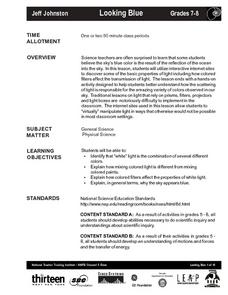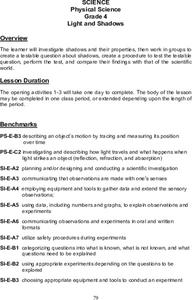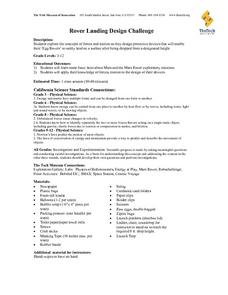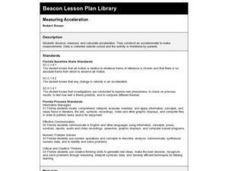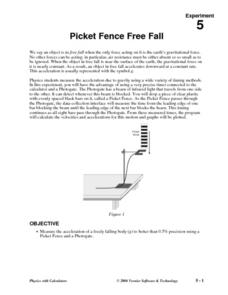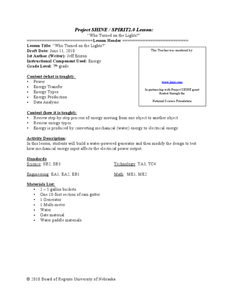Curated OER
Traveling Bowls
Students investigate the relationship between force and motion while conducting an experiment to answer the question,"How do objects move?". In small groups, they predict how many washers are needed to pull a bowl across a finish line.
Curated OER
Looking Blue
Students participate in a research project that is exclusively using the internet. The author states that traditional labs are hard to conduct for a light lab. This one uses the internet with the intention that students can manipulate...
Curated OER
Planets Curriculum
Students complete an in-depth study of the known planets in the solar system. As a class, students identify the planets that are known in the universe, in the night sky. They explain the differences between planets and stars and the...
Curated OER
Light And Shadows
Fourth graders explore the properties of shadows. In pairs they trace each other's shadows in chalk and re-draw their shadow outlines every three hours, design their own shadow investigation, and complete various worksheets related to...
Curated OER
Energy Motion in the Ocean
Students explore the wave energy that is generated and transferred in the ocean. Through the use video and the Internet, students explore the aspects of a wave and how its energy affects the ecology of the seashore.
Curated OER
How Do Things Move?
In this motion learning exercise, students will use a word bank to fill in the definition of Newton's three laws of motion. Then students will complete 4 short answer questions giving examples of Newton's three laws of motion.
Curated OER
Newton Car
Students demonstrate Newton's Second Law of Motion by showing the reaction of a rolling car by increasing its mass and propulsion.
Curated OER
Lighten Up!
Third graders observe light as a form of energy, that it can be reflected/bounced, refracted/bent and absorbed. They explore how different types of light affect our lives as a whole. Songs are researched that involve light (ex. "You...
CPO Science
Physics Skill and Practice Worksheets
Stop wasting energy searching for physics resources, this comprehensive collection of worksheets has you covered. Starting with introductions to the scientific method, dimensional analysis, and graphing data, these skills practice...
Curated OER
Which Falls Faster?
Second graders study force and what it does. In this motion lesson students complete a demonstration on force and gravity and share their ideas.
Curated OER
Rover Landing Design Challenge
Young scholars examine the concepts of forces and motion. They work together to design protective devices for their egg rovers as they are dropped from a specific height. They record their observations and discuss.
Curated OER
Super Gelatin
Learners investigate the refraction properties of gelatin to calculate its index of refraction. They discover that as the light travels through the gelatin, its speed and wavelength also change. Students find th indes of refraction of an...
Curated OER
Energy Transformation with Simple Machines
First graders identify both potential and kinetic energy in a game they play in the classroom. They listen as the teacher explains the difference between potential and kinetic energy when observing a simple machine. Using simple...
Curated OER
Measuring Acceleration
Learners create an accelerometer and take measurements of acceleration in a moving car. They study the car speeding up in a straight line, slowing in a straight line and curving at constant speed. They prepare a lab report showing...
Curated OER
Picket Fence Free Fall
Students measure acceleration using a Picket Fence and a Photogate. In this physics lesson, students drop an object and measure the acceleration of the object free falling. They log their data using the TI.
Alabama Learning Exchange
This Is How We Roll!
Students research how roller coasters work. In this physics lesson, learners research the history of roller coasters and the safety factors in the design of a roller coaster on the website www.learner.org/exhibits/parkphysics. They...
Curated OER
Balloon Rockets
Students build pinwheel airplanes and balloon rockets to determine which ones fly faster and which fly farther.
Pennsylvania Department of Education
Energy in Motion
Fifth graders explore energy transfer. In this thermal energy lesson plan, 5th graders stretch rubber bands several times and estimate the band's temperature change. Students identify this action as an example of thermal energy. Students...
Curated OER
Harmonic Motion
In this waves worksheet, high schoolers review the characteristics of harmonic waves including amplitude, cycle, phases, and friction. This worksheet has 37 problems to solve.
Curated OER
Plants in Motion
In this plants worksheet, learners watch movies about plant growth and then answer multiple choice and short answer questions about them. Students answer 6 questions total.
Curated OER
Who Turned on the Lights?
Seventh graders discuss how energy is transformed from one form to another. In this physics lesson, 7th graders design and build their own hydro generator. They identify the factors that affect its energy production.
Curated OER
Keep It Hot
Students design and conduct an experiment to explore the insulating abilities of different materials for keeping a liquid in a paper cup warm. A small group of lab partners test four different materials: black paper, white paper,...
Curated OER
Free Up the Ketchup!
Students, in teams, use given materials and their knowledge of Newton's First Law to create a device that will remove a sticky ping pong ball from a 16-oz. cup (which represents ketchup stuck in a bottle.)
PBS
Blow the Roof Off!
Blow the minds of young scientists with this collection of inquiry-based investigations. Based on a series of eight videos, these "hands-on, minds-on" science lessons engage young learners in exploring a wide range of topics...



